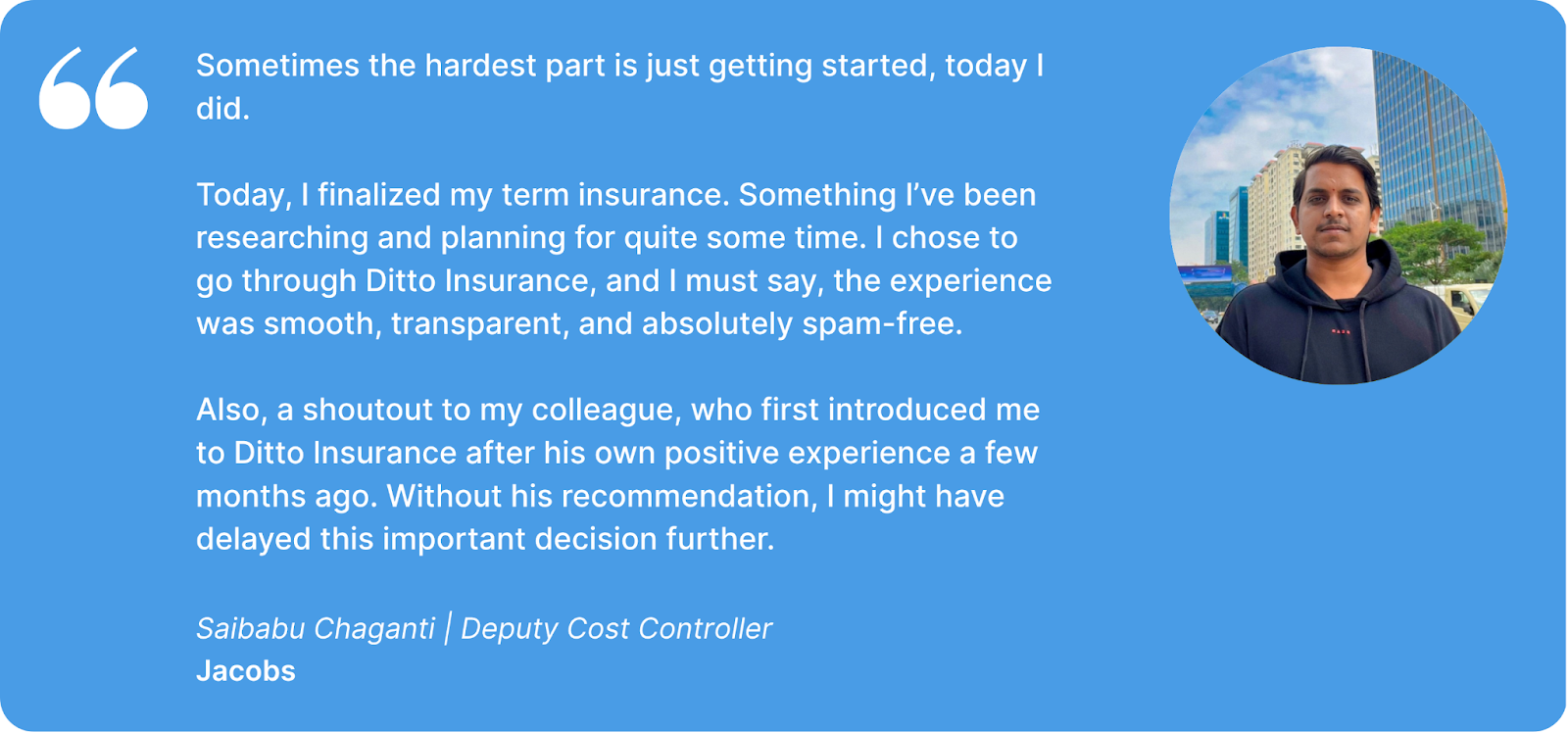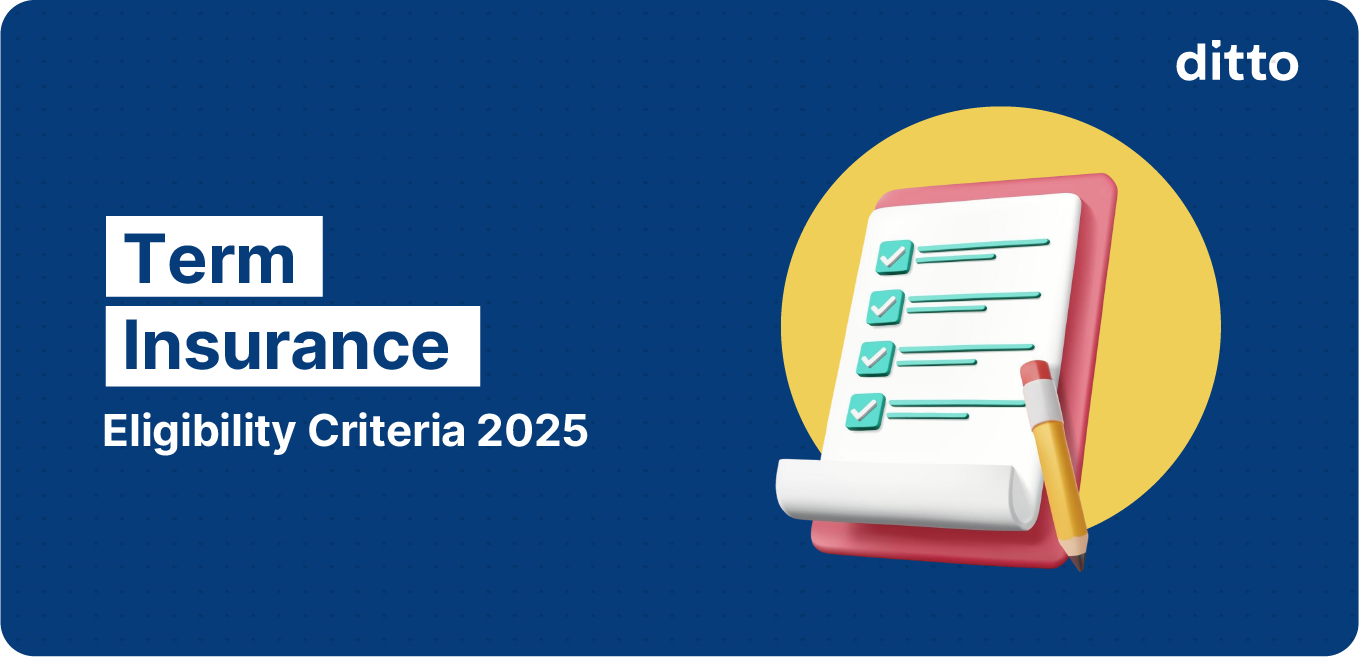Why is it Important to Understand the Term Insurance Eligibility Criteria?
Several factors, such as age, location, education, medical history, income, and occupation affect term insurance eligibility criteria. You must understand and meet the requirements associated with these factors to qualify for coverage and ensure your application is approved without delays or additional underwriting requirements.
Introduction
Many life insurance applications in India face delays or rejections because applicants overlook one simple step: checking their term insurance eligibility. Even a slight mismatch can lead to rejections and leave families unprotected.
At Ditto, our advisors have helped numerous customers choose the right policy and resolve countless eligibility-related issues.
In this guide, we have compiled their insights to help you understand:
- What are the term insurance eligibility criteria?
- Expert tips and tricks to avoid application or claim rejections
- What if you don't meet these term insurance eligibility conditions?
Friendly reminder: It’s easy to get lost comparing policies and premiums. Instead of spending hours on it, why not get personalised insurance advice from Ditto? We offer free consultations with zero spam! Just 30 minutes to clarify all your doubts. Book a call now!

What Are the Term Insurance Eligibility Criteria?
Age
You must be at least 18 years old to purchase a term insurance plan in India. The maximum entry age ranges from 60 to 65 years. A few insurers, like HDFC Life, allow entry until 65 years, but delaying your purchase can significantly increase your premiums.
Location
Most term insurance policies are available to Indian citizens, NRIs, and OCIs However, those residing in high-risk or politically unstable countries may face stricter documentation requirements or adjusted premiums, depending on mortality risks (e.g. Ukraine and Sudan).
Medical History
Your health directly impacts term insurance eligibility. Those with pre-existing conditions (e.g. diabetes or hypertension) may face higher premiums or restricted coverage. A medical test is usually required before policy issuance, and most insurers cover or reimburse its cost.
Education
Insurers also set educational qualifications as a baseline for term insurance eligibility. For instance, a few may restrict access to their plans for people whose highest qualification is a 10th pass or lower. While most insurers have this criterion in place, some do not.
Income
Most insurers offer coverage equivalent to 20-25 times your annual income. They require a minimum yearly income of ₹3.5 lakh for salaried applicants, while self-employed individuals must provide at least two years of income tax returns (ITRs) to prove stable income.
Previous Policies
If you already have another life insurance policy, your current application will be reviewed after considering the policy you purchased earlier. This helps ensure your total sum assured limit does not exceed the permissible limit based on your income bracket.
Occupation
Certain high-risk professions, such as construction, merchant navy, or aviation, may lead to higher premiums or limited coverage options for your plans. In most cases, insurers may also require additional documentation if your job also carries such inherent risks.
Lifestyle Habits
Lifestyle choices, such as smoking, alcohol consumption, or participation in extreme sports, can influence your term insurance eligibility. For instance, smokers are classified as high-risk applicants, with insurers applying a 50-70% loading charge, which may also go up to 100%.
Want to find your ideal coverage amount? Use Ditto’s term insurance calculator to get an estimate.
Term Insurance Eligibility: Expert Tips to Keep in Mind
- The earlier you buy term insurance, the lower your premiums will be since you are considered healthier and less prone to life-threatening risks.
- While insurers may allow you to extend your coverage until you turn 75 or 80, opting for an extended policy may not always be necessary.
- Insurers may require additional documentation or stricter underwriting for higher coverage, especially if it doesn’t align with your income.
- If you’ve been declined a life insurance policy, disclose it honestly in your new application. Non-disclosure can lead to rejection later.
- Insurers may exclude deaths resulting from risky activities like skydiving, bungee jumping, or scuba diving if you do these regularly.
Documents Required for Buying Term Insurance Plans
Proof of Identity
Proof of Income
Medical Reports
Nominee Details
What If You Don't Meet These Term Insurance Eligibility Conditions?
If you fail to meet any criteria, such as being outside the age bracket of 18-65 years, or failing to clear your medical tests, you may not qualify for term insurance. In such cases, insurers might reject your application or approve it with limited coverage, depending on their underwriting guidelines. You can also get in touch with Ditto’s IRDAI-certified experts to know more about other options available.
Did You Know?
Once your policy is approved and active, future changes in your income or health condition will not affect the validity of your coverage.
Why Choose Ditto for Your Term Insurance?
At Ditto, we’ve assisted over 8,00,000 customers with choosing the right insurance policy. Why customers like Saibabu love us:

- No-Spam & No Salesmen
- Rated 4.9/5 on Google Reviews by 12,000+ happy customers
- Backed by Zerodha
- 100% Free Consultation
You can book a FREE consultation. Slots are running out, so make sure you book a free call now!
Ditto’s Take on Term Insurance Eligibility
Acknowledging the term insurance eligibility criteria might help you stay prepared in advance. You will already be aware of your maximum coverage amount and submit the relevant documents to speed up the process of availing the plan.
While these criteria stand true for all reputed insurers, it’s best to cross-check the list when you are finalizing a term insurance policy.
This ensures that you apply for a suitable policy that aligns with your education, financial capacity, and occupation.
Not sure whether you meet the term insurance eligibility criteria? Book a free call or WhatsApp us to seek assistance.
Frequently Asked Questions
What is the eligibility for 1 crore term insurance?
In most cases, your income must be above ₹4 to ₹5 lakh to be eligible for a 1 crore term insurance. Like most term insurance policies, you can purchase the plan if you are 18 years old. The maximum age limit on the policy is 65 years.
What is the minimum income required for term insurance?
There is no minimum income requirement for term insurance. However, in most cases, those with income above ₹3.5 lakh are eligible for buying plans. Insurers may require income proof to ensure you can afford the premiums.
What is the maturity age limit for term plans?
While some policies, such as whole life insurance, provide coverage for your entire lifetime, most term insurance plans have a maturity age limit of around 85 years.
Can I buy term insurance without income proof?
In India, getting term insurance without income proof is generally not possible. That said, this option is available only for housewives, depending on the husband’s income and term insurance cover. For example, under the Bajaj Superwoman Term Plan, a housewife can get coverage of up to ₹50 lakhs if her spouse’s annual income is at least ₹5 lakh.
How much term insurance do I need in India?
There’s no one-size-fits-all number. Your ideal coverage depends on your lifestyle, dependents, financial goals, and existing wealth. Alternatively, you can try a few proven strategies, such as the income-based or expense liability methods, to figure out your coverage.
Last updated on:









